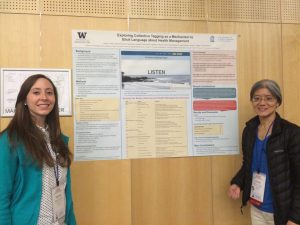Research Overview

Since 1972, University of Washington has received more federal research funding than any other U.S. public university. Total research funding is over $1 Billion. Our track record of collaborative research, coupled with strong individual research groups, has kept the University of Washington globally competitive. More information about U.W. research is available here.
The research portfolio of the Department of Biomedical Informatics and Medical Education crosses a broad range of disciplines in many departments and schools, focusing on using biomedical information to improve health and education. Our core faculty are typically working on 3-4 grants at any time, with an overall portfolio of around 100 grants our faculty are involved with. Members of our faculty, our graduate students, and our postdoctoral fellows have opportunities for collaboration with almost every discipline. Faculty and student research interests range from foundational to applied, and some faculty take their applied work and put it into practice via tight collaborations with our clinical computing and research computing environments, as well as tight collaborations with the UW precision medicine initiative.
Foundational research in the Department includes: big data, data modeling, data management, data visualization, database, information retrieval, data security/privacy, data integration, knowledge representation and ontologies, computable knowledge resources, computerized decision support, predictive modeling, information design, inference, machine learning, data mining, modeling uncertainty in data and knowledge, information workflow, people and organizational issues, observational/fieldwork methodologies, natural language processing and text mining. Application areas range from translational bioinformatics, to clinical research informatics to clinical informatics including consumer health informatics and population or public health informatics. Many research projects bridge foundational and applied research.
At the heart of a cluster of our research projects are electronic health records. These projects focus on both the front end of electronic health records (e.g., collection and management of health information) and on the back end (e.g., manipulation and mining of “big data” to extract health information) at the population level for predictive analytics.
Opportunities for applied research that can be put into practice are also available, as several members of our faculty are key players in the day-to-day operations of the clinical computing systems of UW Medicine including our Chief Analytics Officer, Chief Research Information Officer, Chief Information Security Officer, and Chief Technology Officer.
Other examples of informatics research include: a) the use of models and simulations to identify the most effective responses to emerging diseases and infections; b) improvements in medical care and in the delivery of medical information through the use of electronic devices (e.g., cell phones); c) the use of devices and monitoring applications to improve care and quality of life for older adults; d) the use of semantic annotation of the physical dynamics of biological processes to merge models from different sources; e) machine interpretation of medical imaging as a basis for medical decisions; f) development of reliable computerized assessment of medical records collected in hospital and clinical settings; g) machine translation to improve public health delivery; h) precision medicine informatics applications; and i) informatics tools to improve global health.